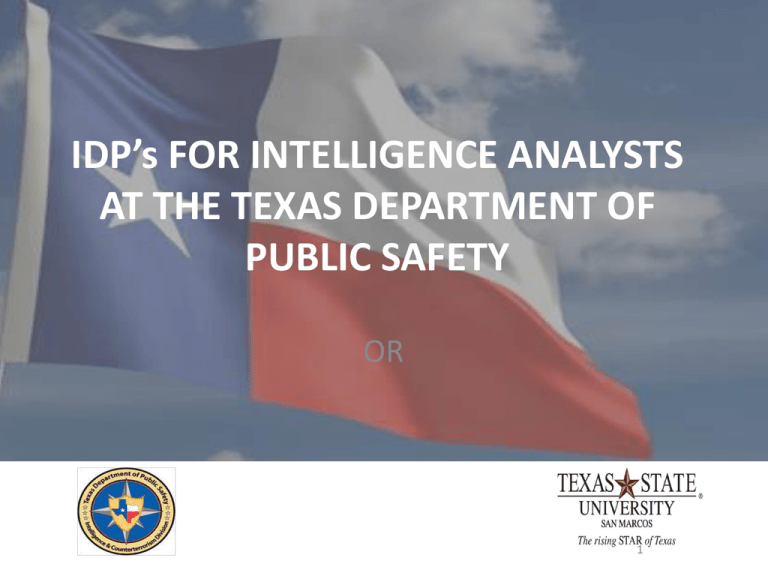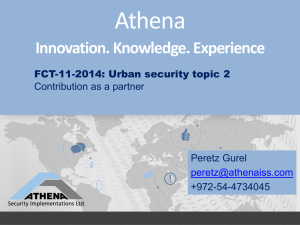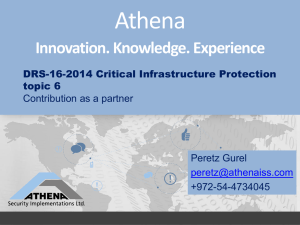
IDP’s FOR INTELLIGENCE ANALYSTS
AT THE TEXAS DEPARTMENT OF
PUBLIC SAFETY
OR
1
THE DEVELOPMENT OF A
PROFESSIONAL DEVELOPMENT
PROGRAM FOR INTELLIGENCE
ANALYSTS: RESULTS FROM THE
TEXAS DEPARTMENT OF PUBLIC
SAFETY INTELLIGENCE
COUNTERTERRORISM CENTER
PROJECT FOR THE STATE OF TEXAS
2
PROJECT STAFF AND AUTHORS
DR. WAYMAN C. MULLINS
DR. J.D. JAMIESON
GRADUATE STUDENT, CRIMINAL JUSTICE, TEXAS STATE UNIVERSITY
MR. ROBERT JENNINGS
GRADUATE STUDENT, CRIMINAL JUSTICE, TEXAS STATE UNIVERSITY
MR. CHARLEY ROOT
DOCTORAL STUDENT, CRIMINAL JUSTICE, TEXAS STATE UNIVERSITY
MR. CHRIS HERRING
TEXAS DEPARTMENT OF PUBLIC SAFETY, ICT
MR. PAUL REYNOLDS
PROJECT CONSULTANT
DEPUTY ASSISTANT DIRECTOR DALE AVANT
PROFESSOR, DEPT. OF CRIMINAL JUSTICE, TEXAS STATE UNIVERSITY
MR. ANDREW MELLON
PROFESSOR, DEPT. OF CRIMINAL JUSTICE, TEXAS STATE UNIVERSITY
DR. MICHAEL SUPANCIC
PROFESSOR, DEPT. OF CRIMINAL JUSTICE, TEXAS STATE UNIVERSITY
GRADUATE STUDENT, CRIMINAL JUSTICE, TEXAS STATE UNIVERSITY
DR. MATT EICHLER AND DR. STEVEN DIETZ, COMPUTER IT SUPPORT
DEPARTMENT OF OCCUPATIONAL EDUCATION, TEXAS STATE UNIVERSITY
GENESIS OF THE PROJECT
TEXAS INTELLIGENCE ENTERPRISE (TxIE)
“The Governor of Texas has designated the Texas
Department of Public Safety, Intelligence and CounterTerrorism Division (DPS-ICT) as the proponent for
intelligence for the State of Texas. In this role, DPS-ICT is
responsible for creating an “Intelligence Enterprise” (IE)
composed of the major law enforcement and homeland
security intelligence centers within the state. This Enterprise
will improve the capability of the state to share information,
technology, training, establish relationships and
obtain/provide appropriate funding for intelligence-related
operations. “
COLLABORATIVE FEDERALLY FUNDED PROJECT
BETWEEN DPS AND THE DEPARTMENT OF CRIMINAL
JUSTICE, TEXAS STATE UNIVERSITY-SAN MARCOS
PROJECT GOALS
CREATE A PROFESSIONAL CULTURE AND CAREER
PATH FOR DPS-ICT CRIME AND INTELLIGENCE
ANALYSTS
ESTABLISH CERTIFICATION THROUGH THE STATE
POLICE OFFICER LICENSING AGENCY, THE TEXAS
COMMISSION ON LAW ENFORCEMENT OFFICER
STANDARDS AND EDUCATION (TCLEOSE)
CREATE STATE-WIDE TRAINING AND EDUCATION
BASELINE FOR ALL ANALYSTS IN TEXAS
PRODUCE A PROFESSIONAL TEXAS INTELLIGENCE
COMMUNITY WHO WORK IN HARMONY; USING
COMMON LANGUAGES, PROTOCOLS, TOOLS, AND
IDENTITY TO ADDRESS AND SOLVE STATE-WIDE
ISSUES
DPS-ICT STRUCTURE
Assistant Director
Intelligence and Counterterrorism
Deputy Assistant Director
Intelligence and Counterterrorism
Major / Commander
Texas Fusion Center
Operations Manager
Captain
Operations Intelligence
Coordinator
Mission Manager
Texas Intelligence Enterprise
Captain / Assistant Commander
Texas Fusion Center
Asst. Operations Manager
Unit Manager / Lieutenant
Texas Homeland Security
(CT, CIKR,SAR,TLO)
Unit Manager
Watch Operations
(Watch Supervisors)
Unit Manager / Lieutenant
Intel Unit
(Gangs, DTO Supervisors)
Unit Manager / Lieutenant
Special Programs
(PSAT, FIT, VIN, DL,Sex Off. Comp.)
Program Manager
Office of Analytic Integrity
and Production Management
Program Manager
Office of Security and
Risk Management
Privacy Officer
AS OF FEB 2012
TX FUSION CENTER (TXFC) STRUCTURE
Major / Commander
Texas Fusion Center
Operations Manager
Captain
Operations Intelligence
Coordinator
Captain / Assistant Commander
Texas Fusion Center
Asst. Operations Manager
Intelligence Unit
Tx Homeland Security
Special Programs
Fusion / Watch Center
Emerging Threat and
DTO Team
Suspicious Activity
Reporting Initiative Team
Post Seizure Analysis
Team / Financial
Intelligence Team
24/7 Watch Center
Criminal Enterprise Team
Counter-Terrorism Team /
Critical Infrastructure
Team
Sex Offender Compliance
Team / Drivers License
Team / VIN Team
Telephone Records
Analysis Center (TRAC)
Region 1 Field Analysts
Region 2 Field Analysts
Region 3 Field Analysts
CID Majors
DPS Regions 1-6
Regional Operations Manager
CID Captains
DPS Regions 1-6
Regional Operations Manager
CID/Intel Field Lieutenant
DPS Regions 1-6
REGIONAL COMMANDERS’ STAFF
Region 4 Field Analysts
Region 5 Field Analysts
Region 6 Field Analysts
BEYOND DPS-ICT
STATE OF TEXAS
FUSION/INTELLIGENCE CENTERS
STATE-WIDE BUY-IN FOR ALL
INTELLIGENCE ANALYSTS
INTELLIGENCE ENTERPRISE MEMBERS
Texas Fusion Center (TxDPS ICT)
Austin Regional Intelligence Center (ARIC)
• Houston Regional Intelligence Service Center (HRISC)
• Dallas Police Department Fusion Center
San Antonio Regional Intelligence Center (SARIC)
El Paso Police Department Multi-Agency Tactical
Response Information Exchange (MATRIX)
• North Central Texas Fusion Center in Collin County
(NCTFC)
• Arlington Police Department Fusion Center
9
EXAMPLE: Houston Regional Intelligence Service Center
(HRISC) Fusion Center
Primary Parent Agency – Houston Police
Department
Partner Agencies –
Collocated include Metro PD, Harris County SO, DHS, & FBI
Virtually Collocated Partners include
○
○
○
○
○
Located in the Fusion Center
Waller, Montgomery, Liberty, Fort Bend, & Galveston County
Sheriff Dept’s
Constables in each of these counties along with Brazoria County
Seven Municipal Police Departments
Three Educational Institutions PD’s
Three PD’s within the Texas Medical Center
Three civilian analysts
Privacy & Security Officer
Eight Law Enforcement Analysts/Investigators
DHS Report Writer, DHS Intel Officer, & FBI Analyst
Contact Info
Email – HRISCFusionCenter@cityofhouston.net
Phone Numbers – 713.884.4710
•
Mission and Focus
The mission of the Houston Regional Intelligence
Service Center (HRISC) is to provide continuous
security to our region by gathering, developing and
sharing intelligence into the capabilities, intentions,
and actions of terrorist groups and individuals which
pose a threat to our populace and region.
•
Future Plans
•
Expansion of the Virtually Collocated
Partnership program by including
additional Law Enforcement Agencies,
Fire & Rescue, Emergency Operations
Centers, along with Private Sector
entities
•
Sponsoring homeland security related
training for the region
•
Product production relative to the
regional threat
•
Maturation of Fusion Liaison Officer
program
•
Maturation and expansion of cyber
program for the region
10
TCLEOSE CERTIFICATION
ESTABLISH COMMON CORE
COMPETENCIES FOR ANALYSTS IN
TEXAS
PROVIDE A MECHANISM TO
RECOGNIZE THEIR EXPERTISE
HAVE CLEARLY DEFINED OUTCOME
MEASURES OF THE EFFICACY OF
TRAINING
PROVIDE RECOGNITION OF
DEMONSTRATED EXPERTISE
DPS-ICT
TWO DIVISIONS
FUSION CENTER
BORDER SECURITY OPERATIONS CENTER
ALL CURRENT POSITIONS WILL BE
RECREATED
RESTRUCTURED
CREATED NEW
FINAL RESTRUCTURING WILL RESULT
IN FIVE JOBS OF INCREASING
COMPLEXITY AND SKILL SET
CRIME ANALYST I AND II
INTELLIGENCE ANALYSIS I, II AND III
DPS-ICT JOB DESCRIPTIONS
Title
General Description
Crime Analyst I
Performs highly complex (senior-level) crime analysis work. Work involves the collection, processing, and
dissemination of data and information to and from local, state, federal, and international jurisdictions to
support and enhance the investigation and prosecution of individuals and groups engaged in criminal activities.
May assign and/or supervise the work of others. Works under limited supervision, with considerable latitude
for the use of initiative and independent judgment.
Performs highly advanced (senior-level) crime analysis work. Work involves coordinating the collection,
processing, and dissemination of data and information to and from local, state, federal, and international
jurisdictions to support and enhance the investigation and prosecution of individuals and groups engaged in
criminal activities. May plan, assign, and/or supervise the work of others. Works under minimal supervision,
with extensive latitude for the use of initiative and independent judgment.
Crime Analyst II
Criminal
Performs complex (journey-level) criminal intelligence research and analysis work. Work involves analyzing
Intelligence Analyst complex data, writing reports, and identifying patterns of criminal activity. May train others. Works under
I
general supervision, with limited latitude for the use of initiative and independent judgment.
Performs highly complex (senior-level) criminal intelligence research and analysis work. Work involves
Criminal
coordinating complex data analysis, report writing, and identification of patterns of criminal activity. May assign
Intelligence Analyst and/or supervise the work of others. Works under limited supervision, with considerable latitude for the use of
II
initiative and independent judgment.
Performs highly advanced (senior-level) criminal intelligence research and analysis work. Work involves
Criminal
overseeing the analysis of complex data, the development of reports, and the identification of patterns of
Intelligence Analyst criminal activity. May plan, assign, and/or supervise the work of others. Works under minimal supervision, with
III
extensive latitude for the use of initiative and independent judgment.
DPS-ICT
JOB STRUCTURING UNIQUE WITHIN
THE TxIE COMMUNITY
CHALLENGE WAS TO DEVELOP A
SYSTEMATIC PROGRAM OF
PROFESSIONAL DEVELOPMENT
SPANNING ALL FIVE POSITIONS
CONDUCTING A NEEDS ANALYSIS
REVIEW OF LITERATURE
STRUCTURED INTERVIEWS
DPS ANALYSTS
○ SELECTED BY MANAGEMENT AT ICT
○ JOBS DID NOT EXIST
○ MOST STAFF TRANSFERRED FROM OTHER
RESEARCH, CRIME ANALYST AND NONCOMMISSIONED POSITIONS
○ VARIETY OF EXPERIENCES AND NONANALYST BACKGROUNDS
TEXAS FUSION/INTELLIGENCE CENTER
ANALYSTS
NEEDS ANALYSIS - STRUCTURED
INTERVIEW
JOB INFORMATION
DPS WORK HISTORY
○
GENERAL INTELLIGENCE ANALYST HISTORY
○
TRAINING ATTENDED, CURRICULUM AND MOST/LEAST VALUABLE TOPICS
IN THAT TRAINING
MOST CRITICAL TRAINING TOPICS ANALYSTS NEED
OTHER LAW ENFORCEMENT TRAINING
JOB KSAs AND CORE COMPETENCIES
MOST/LEAST VALUABLE KSAs
MODIFIED CIT JOB ANALYSIS
○
LAW ENFORCEMENT, MILITARY, OTHER
TRAINING HISTORY AND BACKGROUND
LENGTH OF SERVICE, JOBS, CURRENT JOB
IDENTIFY MOST OUTSTANDING AND WORST ANALYST EVER KNOWN AND
WHAT KSAs ARE DEMONSTRATED THAT MAKE THEM BEST OR WORST
RATING OF LITERATURE-IDENTIFIED KSAs
OVER 110 IDENTIFIED
RATE ON LIKERT SCALE (1 = NOT AT ALL IMPORTANT, 5 = CRITICALLY
IMPORTANT)
NEEDS ANALYSIS – CORE
COMPETENCIES
NEEDS ANALYSIS RESULTED IN A FINAL LIST OF 13 CORE
COMPETENCIES
THINKING CRITICALLY within the intelligence cycle
COLLABORATING and sharing information
Fusing intelligence and law enforcement TRADECRAFT in a homeland
security environment
COMMUNICATING analytic observations and judgments or generating
analytic products
Turning CONCEPTS AND PRINCIPLES into action
ETHICS, use of intelligence collection and dIssimination
COMPUTERS AND DATA-BASED SYSTEMS
Conducting RESEARCH AND ANALYSIS (being able to establish
RELIABILITY AND VALIDITY of intelligence data)
Understand components of the LAW ENFORCEMENT PROCESS
INDUCTIVE AND DEDUCTIVE thinking
LEGAL ISSUES surrounding the intelligence cycle
Understands CRIME ANALYSIS procedures and methodologies
AGENCY POLICIES AND PROCEDURES
FINAL CORE COMPETENCIES
TCLEOSE CERTIFICATION IS BASED
UPON THE FINAL IDENTIFIED CORE
COMPETENCIES AND THE ABILITY TO
TEST THOSE COMPETENCIES. AS A
RESULT OF THIS REQUIREMENT, IT
WAS DECICDED TO NOT INCLUDE:
AGENCY POLICIES AND PROCEDURES
AND INSTEAD INCLUDE IT AS A LOCAL
OJT COMPONENT OF THE PROGRAM
CLASSROOM
IN-SERVICE
ON-LINE
CORE COMPETENCIES MATCHED
TO RELEVANT KSAs
TEAM MEMBERS MATCHED THE
IDENTIFIED KSAs TO EACH CORE
COMPETENCY
MATCHED CORE COMPETENCY by
KSA TO EACH JOB
MATCHING CORE COMPETENCIES
TO JOB DESCRIPTIONS
LIMITATION WAS JOB DESCRIPTIONS
APPROVED BY STATE LEGISLATURE
AND LISTED IN OFFICIAL STATE JOB
CLASSIFICATION SCHEMA
FOR EACH JOB, TEAM MEMBERS
EVALUATED THE TASKS LISTED TO
EACH CORE COMPETENCY
IDENTIFY COURSE CURRICULA
LITERATURE REVIEW OF EXISTING
INTELLIGENCE ANALYST PROGRAMS
IDENTIFIED A WIDE-VARIETY OF PREEXISTING TRAINING CURRICULA
EACH WAS EVALUATED BY TEAM AND ICT
STAFF FOR BEST-FIT TO THE TxIE PROJECT
FOR SOME CORE COMPETENCIES,
NOT ADEQUATE TRAINING CURRICULA
UNCOVERED
RESEARCH METHODOLOGY
STATISTICS
TRANSLATING CORE
COMPETENCIES/KSAs INTO
CURRICULUM
CURRICULUM FROM MUTLIPLE SOURCES WAS
REVIEWED FOR RELEVANCY TO THE TxIE PROJECT
DECISION WAS MADE TO USE DHS CURRICULUM AS BASE
STANDARD
STATE
PRIVATE
ASSOCIATION
MILITARY
MOST GENERAL
MOST COMPREHENSIVE
INCLUDED ALL CORE COMPETENCIES AND KSAs
CLOSEST FIT TO TxIE PROJECT REQUIREMENTS
THREE NEW UNITS CREATED FOR THIS PROJECT
RIDE-ALONG PROGRAM
RESEARCH METHODS
STATISTICS
MATCHING COURSE UNITS TO
CORE COMPETENCIES, KSAs
AND JOBS
FOR EACH POTENTIAL COURSE
UNIT OF INSTRUCTION, TEAM
MEMBERS ASSESSED WHICH CORE
COMPETENCIES AND KSAs WERE
TAUGHT BY THAT COURSE
ENSURED ALL CORE
COMPETENCIES AND KSAs WERE
COVERED SOMEWHERE IN
TRAINING
COURSE UNIT LIST THAT INCLUDED
ALL CORE COMPETENCIES, KSAs
AND CRITICAL SKILLS TRAINING
10 PRIMARY UNITS OF INSTRUCTION
OVERVIEW OF INTELLIGENCE ANALYSIS
INTELLIGENCE FUSION PROCESS
INTELLIGENCE-LED POLICING
OPEN SOURCE INTELLIGENCE
CRITICAL THINKING AND MEMORY
PRINCIPLES OF INTELLIGENCE WRITING AND BRIEFING
VULNERABILITIES, THREATS AND RISK ASSESSMENT
RESEARCH METHODOLOGY
STATISTICS
INTELLIGENCE COLLECTION MANAGEMENT
NON-COURSE BUT CRITICAL:
○ RIDE-ALONG PROGRAM
CURRICULUM ISSUES AND
CHALLENGES
FIVE SEPARATE JOBS
CRIME ANALYST I & II
INTELLIGENCE ANALYST I, II, & III
CLASSROOM INSTRUCTION TIME AND
LIMITATIONS
FOR EXAMPLE, DRAFT CURRICULUM SUGGESTED
INTEL ANALYST I COURSE WOULD INVOLVE 167
HOURS OF TRAINING (OR 4.175 WEEKS OF
INSTRUCTION)
AGENCIES CANNOT SEND ANALYSTS TO 4+ WEEKS
OF TRAINING
IDENTIFYING AND ARRANGING SMEs TO INSTRUCT
COMPUTER INSTRUCTION
OTHER CONSIDERATIONS
DEVELOPING A DRAFT
CURRICULUM
ONE TEAM MEMBER ASSIGNED AS
PRIMARY UNIT DEVELOPER
REVIEWERS:
ONE TEAM MEMBER WHO WAS EXPERT
ONE TEAM MEMBER WHO WAS NOT
EXPERT
CURRICULUM REVIEW AND
VALIDATION
AFTER DRAFT CURRICULUM
WRITTEN, AGAIN EVALUATED:
MATCHING JOB DESCRIPTIONS TO
TRAINING
ASSESSING VALIDITY OF TRAINING TO
JOB
MATCHING JOB DESCRIPTIONS
TO TRAINING
EACH TASK IN THE STATE JOB
DESCRIPTION FOR ALL FIVE
POSITIONS WAS EVALUATED BY
TEAM MEMBERS
CORE COMPETENCIES
TRAINING UNIT AND MATERIAL
PROCEDURE INSURED ALL JOB
DESCRIPTIONS WERE FULLY MET
BY PROFESSIONAL DEVELOPMENT
PROGRAM
EVALUATING DRAFT CURRICULA
DHS
DPS-ICT ANALYSTS
FUSION/INTELLIGENCE CENTER
ANALYSTS
FORMAL REVIEW
RATED ALL UNITS AND TOPICS BY
IMPORTANCE TO JOB
EXPERTS IN FIELD
PRACTICIONERS AND ACADEMICIANS
OUTSIDE CONSULTANTS
EVALUATING DRAFT CURRICULA –
CONTINUED
IMPROVED CONTENT
IMPROVED REALTIONSHIP OF
CONTENT TO JOB
INCREASED RELEVANCE OF CONTENT
AND EXERCISES
HELPED ESTABLISH COURSE
ORGANIZATION
DETERMINATION OF IN-CLASS VS ONLINE PRESENTATION
INCREASED BUY-IN BY ALL
PARTICIPANTS
BETA TESTING THE CURRICULUM
(TO-DO)
EARLY SUMMER, IA I WILL BE BETATESTED
READING LEVEL
COGNITIVE LEVEL
RELEVANCE (EXAMPLES, EXERCISES)
TIME TO DELIVER
GENERAL FLOW
PROGRAM INSTRUCTOR ISSUES
AND CONSIDERATIONS
INSTRUCTOR MATERIALS AND
INSTRUCTIONS
IDENTIFICATION OF SMEs
PROGRAM MAINTENANCE
ISSUES AND CONSIDERATIONS
PROGRAM ADMINISTRATOR
SUPPORTING MATERIALS
BOOKS AND READING MATERIAL
VIDEOS
STUDENT PRODUCTS
EXAMS AND TCLEOSE TESTS
SCHEDULING COURSES
ADDITIONAL CONSIDERATIONS
POLICY AND PROCEDURES GUIDING
THE DELIVERY OF THE PROGRAM
TRAIN-THE-TRAINER COURSE
MANAGER AND SUPERVISOR COURSE
CONTENT CONTROL
ACADEMIES
INSTRUCTORS
STUDENTS
ON-LINE CONTENT
SUMMARY
CONTRIBUTIONS OF THE TxIE
PROJECT TO THE FIELD
EVOLUTION OF INTELLIGENCE
ANALYSIS IN LAW ENFORCEMENT
STANDARDIZATION OF THE
ANALYTIC FUNCTION
QUESTIONS AND COMMENTS









